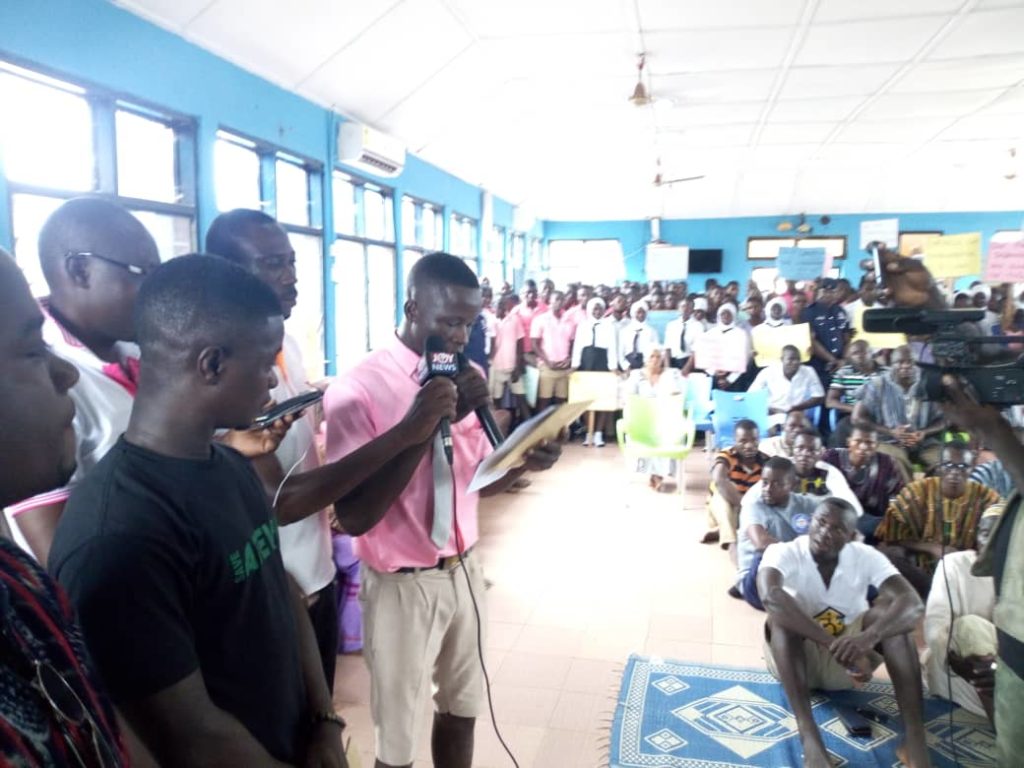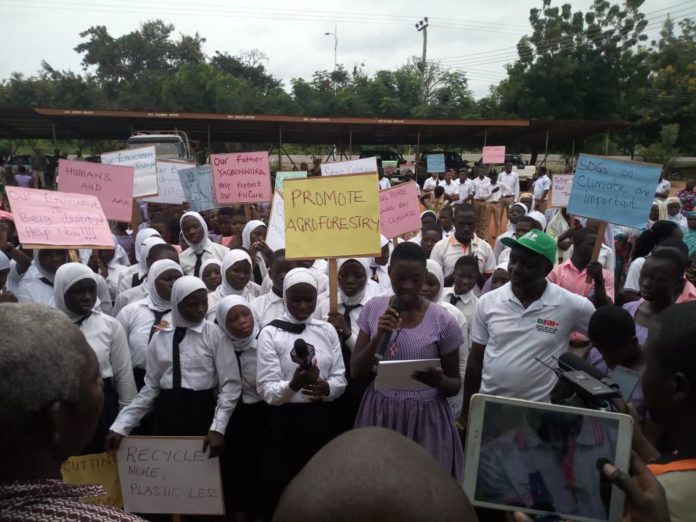Environmental Clubs from various Schools in the Savannah Region yesterday Friday 27th September, 2019 have presented two separate petitions to the Overlord of the Gonja Traditional area, Yagbonwura Tuntunba Boresah Tuntumba and the Savannah Regional Coordinating council to demand actions to mitigate Climate Change as part of the Global Strike for Climate Strike yesterday
‘The Global Climate Strike dubbed; “Fridays for Future” float had students in some schools in the region march through the principal streets of the Savannah Regional capital of Damongo starting from the Damongo Nurses Training College entrance, through to the lorry park where the message of ending climate change action was delivered to the drivers, passengers and the community members.

The team then moved to the Jakpa Palace where a petition was read and presented to the Overlord of the Gonja traditional area, Yagbonwura Tuntumba Boresa Sulemana (I) by Master Awal Seidu, a student of Ndewura Jakpa Technical Senior High School on behalf of the team.
The Overlord thanked the students and other environmental activists present after rceiving the petition and promised to distribute copies of the petition to all the paramouncies within the Gonja Kingdom for immediate action to be taken to be taken to improve the environment within Gonjaland and beyond.
The team, from the Jakpa Palace moved to the Savannah Regional Coordinating Council (SRCC) where another another petition was read and presented to the Savannah Regional Minister by Miss Kabutey Hagar, a student from St Anne’s Girls Senior High School in Damongo,
calling on authorities to take actions to address climate change and its related impact.
Recieving the petition on behalf of the minister, a Deputy Regional Coordinating Director, Alhaji Abu Forgor thanked and assured the public that the Savannah Regional Coordinating Council will work closely with the district assemblies in the region to help improve the issues of climate and the environment as a whole.
Over 300 strikers from School environmental clubs of the Damongo Agric College, Ndewura Jakpa Senior High Technical School, St. Annes Girls Senior High School and Damongo Girls Model Junior High School. The students were joined by other strikers from the departments and institutions such as ‘A’ Rocha Ghana, Forestry Commission- Wildlife Division (Mole National Park), the Ghana National Fire Service, the West Gonja District Environmental Health department, the Environmental Protection Agency, World Vision, the Community Development Agency as well as environmental activists and resource user groups.
The petition of the students among many environmental issues raised said; “We are experiencing rapid deforestation and severe environmental degradation with the subsequent effects of erosion, loss of soil nutrients leading to very low agriculture productivity. Our water bodies are drying up and Pest and Disease outbreak cannot be left of the hook”.
The petition also mentioned that the impact of the degrading environment has further resulted in shifting weather patterns that threaten food security and
unprecedented climate catastrophe. Let us not underestimate the cost of losing these ecosystem services and the implications it may have on our lives.
“Over the years, climate change has become a global headache. Gonjaland in recent times has suffered long period of drought and high temperatures with severe water shortages, little rainfall preceded with strong and frequent thunderstorms and the erratic rainfall pattern coupled with high temperatures make farming which is the core occupation of the people risky and has led to low productivity”; the petition stated.
The demands contained in the petitions presented to both the Yagbonwura and the Savannah Regional Minister included the following:
1. All the District Assemblies in Savannah Region are informed to take Proactive measures to halt ongoing illegal logging and unsustainable charcoal production.
2. Issues of climate change and biodiversity conservation in general are fully mainstreamed in the various districts medium term development plan with clear cut action plans and adequate budget allocations.
3. Pollution of the environment with plastic waste be minimized or stopped if possible.
4. Water bodies are adequately protected woth a recommendation of growing trees around these water bodies and discouraging people from farming at the banks of these water bodies.
5. The voices of women in decision making on natural resources management and governance are recognised and as well involving women in decision making will yield more positive results since they are more result oriented and have the knowledge that could be tapped to practically solve these climate challenge.
nkilgifmonline.com/
Zion Abdul-Rauf, Damongo




